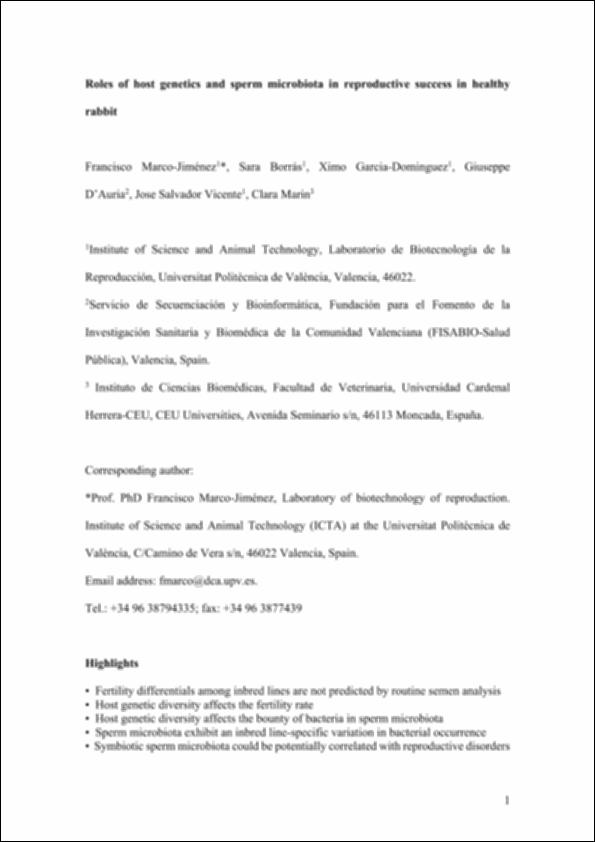Por favor, use este identificador para citar o enlazar este ítem:
http://hdl.handle.net/10637/13478Roles of host genetics and sperm microbiota in reproductive success in healthy rabbit
| Título : | Roles of host genetics and sperm microbiota in reproductive success in healthy rabbit |
| Autor : | Marco Jiménez, Francisco Borrás, Sara García Domínguez, Ximo D'Auria, Giuseppe Vicente Antón, José Salvador Marín Orenga, Clara |
| Materias: | Conejos - Inseminación artificial.; Rabbits - Fertility.; Conejos - Genética.; Rabbits - Genetics.; Rabbits - Artificial insemination.; Conejos - Fecundidad.; Spermatozoa - Quality control.; Esperma - Control de calidad. |
| Editorial : | Elsevier |
| Citación : | Marco-Jiménez, F., Borrás, S., Garcia-Dominguez, X., D'Auria, G., Vicente, J. S. & Marin, C. (2020). Roles of host genetics and sperm microbiota in reproductive success in healthy rabbit. Theriogenology, vol. 158 (dec.), pp. 416–423. DOI: https://doi.org/10.1016/j.theriogenology.2020.09.028 |
| Resumen : | Although the effects of sperm microbiota and sperm quality have been described previously, recent studies provide evidence that female genital modifications triggered by seminal components could be of significant importance to identify some disturbances associated with fertility. So, sperm microbiota could play a key role in sperm quality, contributing to fertilisation. To understand how sperm microbiota diversity is influenced by the host genetics, the symbiotic bacteria in four inbred lines raised in the same animal facility and their effects on sperm quality and fertility were analysed. Forty healthy rabbits from four selected Spanish commercial lines were used in this research (three based on litter performance, designated A, V and LP, and one selected for daily body weight gain, called R). Significant variations in the seminal concentration, morphology and some motion parameters were found among inbred lines, but sperm motility and viability were similar among inbred lines. After mating, inbred lines selected for litter size had the same fertility rate, significantly higher than inbred line selected for body weight (82±3.3%, 79±3.5% and 89±4.5% versus 61±3.7%, for the A, V and LP vs R lines, respectively, p<0.05). Bacteria belonging to Proteobacteria, Firmicutes, Fusobacteria and Bacteroidetes were identified in sperm microbiota. At genus level, the bacterial community composition in the sperm microbiota was influenced by host genetics. A total of 35, 16, 34, and 51 genera were accurately detected in the A, V, LP, and R lines, respectively. Moreover, Enhydrobacter, Ferruginibacter, Myroides Paracoccus, Rheinheimera, Tepidiphilus, Tetradesmus obliquus and Thauera genera were present only in the inbred lines selected for litter size. Moreover, the discriminant analysis revealed Lysinibacillus and Flavobacterium genera as potential biomarkers for fertility. Thus, these two genera may play a key role in fertility. Our results demonstrated the 3 existence of a rabbit inbred line-specific variation in bacterial occurrence in sperm microbiota. Moreover, fertility differentials among inbred lines that were not predicted by routine semen analysis could be partly explained by the symbiotic state of the semen microbiota. |
| Descripción : | Este artículo se encuentra disponible en la siguiente URL: https://www.sciencedirect.com/science/article/abs/pii/S0093691X20305215?via%3Dihub This is a pre-print of an article published in Marco-Jiménez, F., Borrás, S., Garcia-Dominguez, X., D'Auria, G., Vicente, J. S., & Marin, C. (2020). Roles of host genetics and sperm microbiota in reproductive success in healthy rabbit. Theriogenology, vol. 158, 416?423. The final authenticated version is available online at: https://doi.org/10.1016/j.theriogenology.2020.09.028 Este es el pre-print del siguiente artículo: Marco-Jiménez, F., Borrás, S., Garcia-Dominguez, X., D'Auria, G., Vicente, J. S., & Marin, C. (2020). Roles of host genetics and sperm microbiota in reproductive success in healthy rabbit. Theriogenology, vol. 158, 416?423, que se ha publicado de forma definitiva en https://doi.org/10.1016/j.theriogenology.2020.09.028 |
| URI : | http://hdl.handle.net/10637/13478 |
| Derechos: | http://creativecommons.org/licenses/by-nc-nd/4.0/deed.es |
| ISSN : | 0093-691X |
| Fecha de publicación : | 10-dic-2020 |
| Centro : | Universidad Cardenal Herrera-CEU |
| Aparece en las colecciones: | Dpto. Producción y Sanidad Animal, Salud Pública Veterinaria y Ciencia y Tecnología de los Alimentos |
Los ítems de DSpace están protegidos por copyright, con todos los derechos reservados, a menos que se indique lo contrario.


